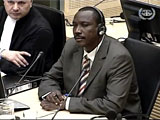The Politics of Surrender
By Séverine Koen for ISN
The pre-trial confirmation-of-charges hearing of Sudanese rebel leader Bahr Idriss Abu Garda at the International Criminal Court (ICC) sets an important precedent that will require the Court to further examine the political implications of surrender.
Abu Garda - accused of having been in charge of an armed group that attacked African Union Mission in Sudan (AMIS) peacekeeping forces in Darfur in September 2007, killing 12 soldiers, severely wounding eight and destroying and stealing AMIS equipment - is the first and only person to ever have voluntarily appeared before the international court.
This “pre-trial,” which is meant to confirm the charges against Abu Garda, ended on 29 October, and the Pre-Trial Chamber now has 60 days to decide whether there is sufficient evidence to confirm the charges and proceed with an actual trial.
In the case of Sudan, the ICC has issued arrest warrants for Sudanese President Omar Al Bashir, former minister of state for humanitarian affairs Ahmad Muhammad Harun and alleged Janjaweed leader Ali Muhammad Ali Abd-Al-Rahman, all of whom remain at large. As such, Abu Garda's motives for voluntarily appearing before the court should be questioned.
According to ICC Prosecutor Luis Moreno Ocampo, Abu Garda had no choice but to appear before the Court: “He’s indicted by the ICC, he becomes a fugitive […] he knows he has no more future as a leader in the Darfur region and that’s why he came [to the ICC],” Ocampo said in a statement.
Yet this explanation seems somewhat incomplete. If Abu Garda is found guilty, the ICC may sentence him to up to 30 years in prison or even life. The choice between life on the run or life imprisonment is not an obvious one, and many might, and indeed have, chosen the freedom of a fugitive over the confinement of a prisoner.
Another theory - and that espoused by Abu Garda himself - says that his voluntary appearance is an attempt by an innocent man to clear his name, and represents a great show of faith in the international justice system. Abu Garda maintains that he was in no way involved in the attack in Haskanita in northern Darfur.
However, the more likely theory is that Abu Garda is attempting to shame the Sudanese government (his opponents) into following his example and facing the ICC, and that his move is entirely political in nature. Indeed, external pagein his statement at the Court on 19 Octobercall_made Abu Garda said: “I don’t believe I rightfully belong [at the ICC]. I came here because I believe in justice and I believe in the rule of law. If my presence here helps to improve the situation […] of my suffering people in Darfur and encourage others to come and cooperate with the International Criminal Court, or let others, those who have committed real crimes [against] our people of Darfur in Sudan, come to this court, […] I will be satisfied.”
Abu Garda's move is a politically shrewd one designed to implicitly contrast his own willingness to comply with the ICC with the refusal of al-Bashir and others to face the international court. It is also intended to be played out in full view of the international community, taking an internal political feud to the international stage.
Certainly, the Sudanese government has denounced Abu Garda’s appearance at the ICC as a political play and continues to maintain that the ICC is an illegitimate court undermining African sovereignty and a tool of neo-colonialism.
The case of Abu Garda presents the ICC with a tough decision. If Abu Garda’s voluntary appearance is an attempt to champion his faction’s cause, then the international court could be viewed as indirectly playing politics, thus the risk of tainting its credibility.
That said, at least in Africa, where the ICC is viewed through a negative lens and seen as specifically targeting the continent, Abu Garda's voluntary appearance before the court could lend the international justice system some additional credibility, as he his move necessarily means that he recognizes its legitimacy.
But whether this in turn translates into a victory for international justice is not clear, as his voluntary appearance could embroil the Court in internal politics. In the end, the body may decide that it must rely chiefly on arrests, even if it means that some indictees may never be caught, tried and brought to justice.

